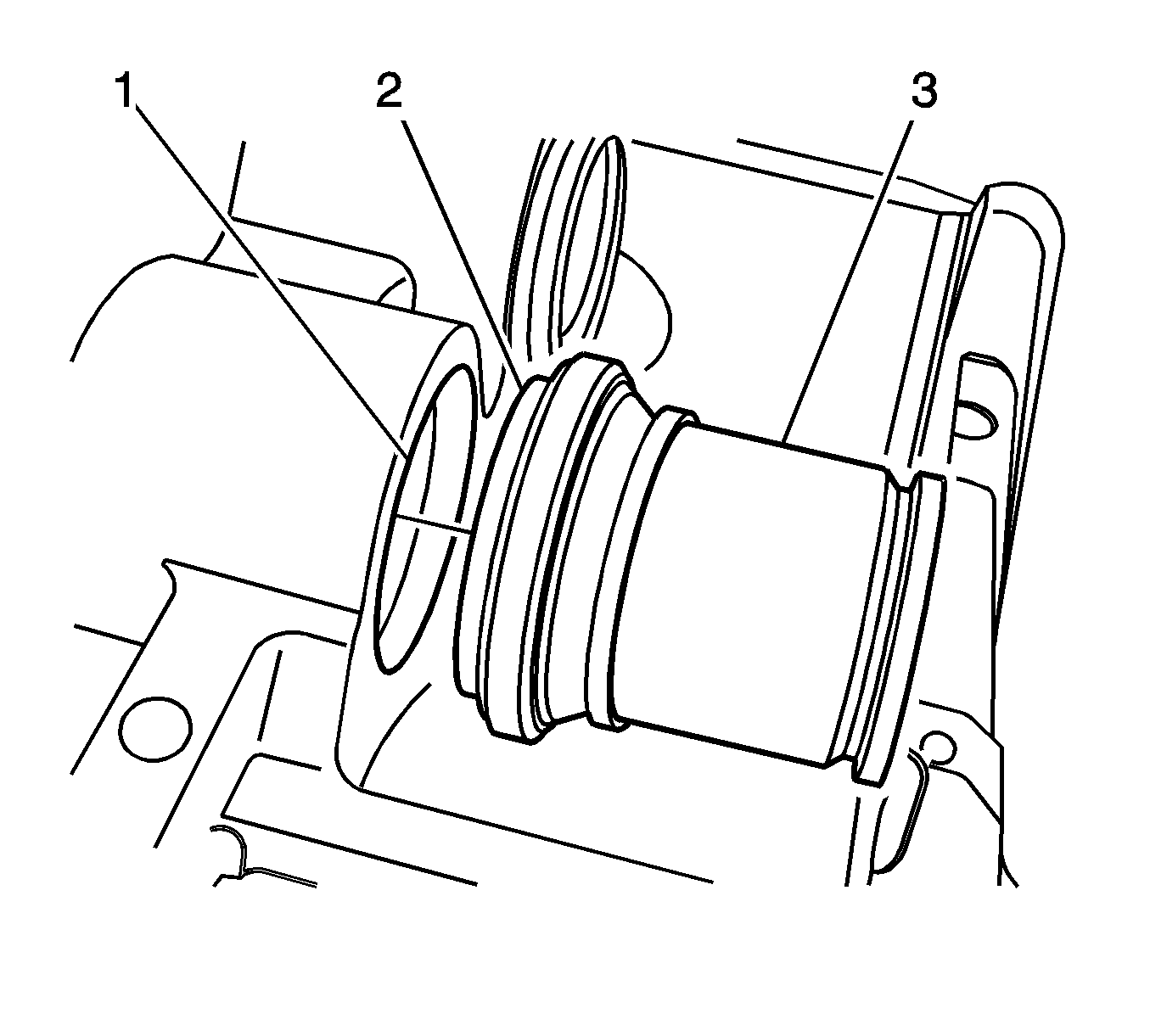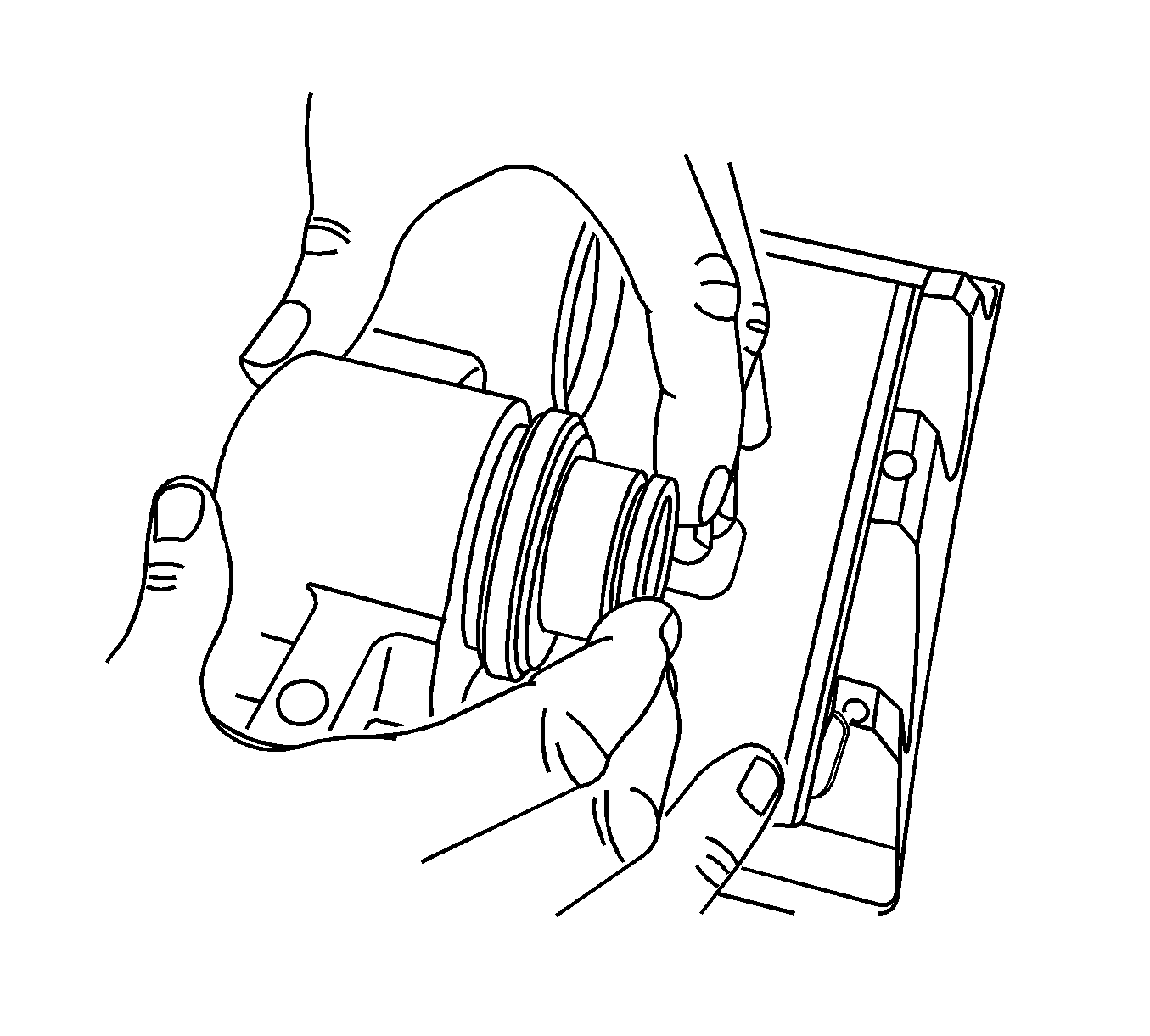Front Brake Caliper Overhaul L36
Tools Required
J 35777 Caliper Piston Seal Installer
Caution: Refer to Brake Fluid Irritant Caution in the Preface section.
Notice: Refer to Brake Fluid Effects on Paint and Electrical Components Notice in the Preface section.
- Remove the front brake caliper from the vehicle. Refer to Front Brake Caliper Replacement .
- Remove the brake caliper piston from the caliper bore by directing low pressure compressed air into the caliper bore through the fluid inlet hole.
- Using a small wooden or plastic tool, remove the piston dust boot seal (2) from the seal counterbore in the caliper (1) and discard the boot seal.
- Using a small wooden or plastic tool, remove the piston seal (4) from the caliper bore and discard the piston seal.
- Remove the bleeder valve (5) and cap (6) from the caliper (1).
- Clean the brake caliper piston bore and seal counterbore, and the caliper piston with denatured alcohol, or equivalent.
- Dry the caliper piston bore and counterbore, and the piston with non-lubricated, filtered air.
- Inspect the caliper bore for cracks, scoring, pitting, excessive rust, and/or excessive corrosion.
- If light rust or light corrosion are present in the caliper bore, attempt to remove the imperfection with a fine emery paper. If the imperfection cannot be removed, replace the caliper assembly.
- If cracks, scoring, pitting, excessive rust, and/or excessive corrosion are present in the caliper bore, replace the caliper assembly.
- Inspect the caliper piston for cracks, scoring, and/or damage to the chrome plating. Replace the caliper piston if any of these conditions exist.
- Lubricate the new piston seal with Delco Supreme 11®, GM P/N 12377967 (Canadian P/N 992667) or equivalent DOT-3 brake fluid from a clean, sealed brake fluid container.
- Install the lubricated, new piston seal into the caliper bore.
- Install the caliper piston into the caliper bore.
- Install the new piston dust boot seal over the piston.
- Using the J 35777 fully seat the boot in the caliper.
- Install the bleeder valve and cap to the caliper and tighten the valve securely.
- Install the caliper to the vehicle. Refer to Front Brake Caliper Replacement .
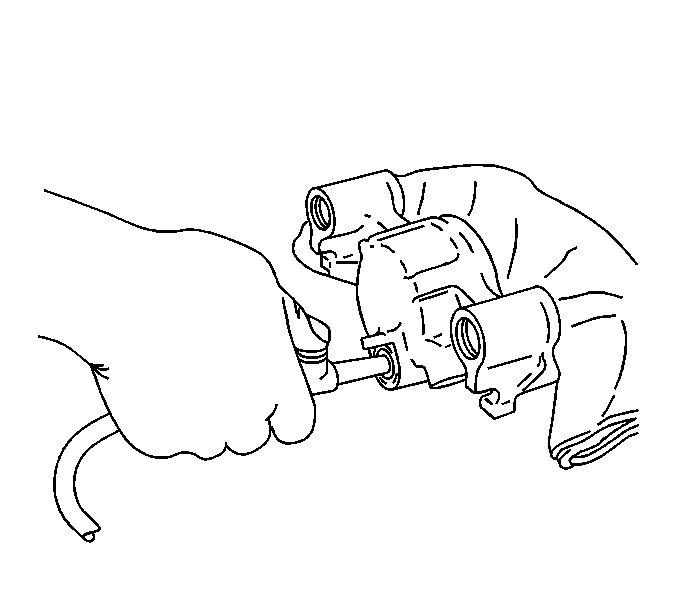
Caution: Do not place your fingers in front of the piston in order to catch or protect the piston while applying compressed air. This could result in serious injury.
Notice: Use clean cloths to pad interior of caliper housing during piston removal. Use just enough air to ease the pistons out of the bores. If the pistons are blown out, even with the padding provided, it may be damaged.
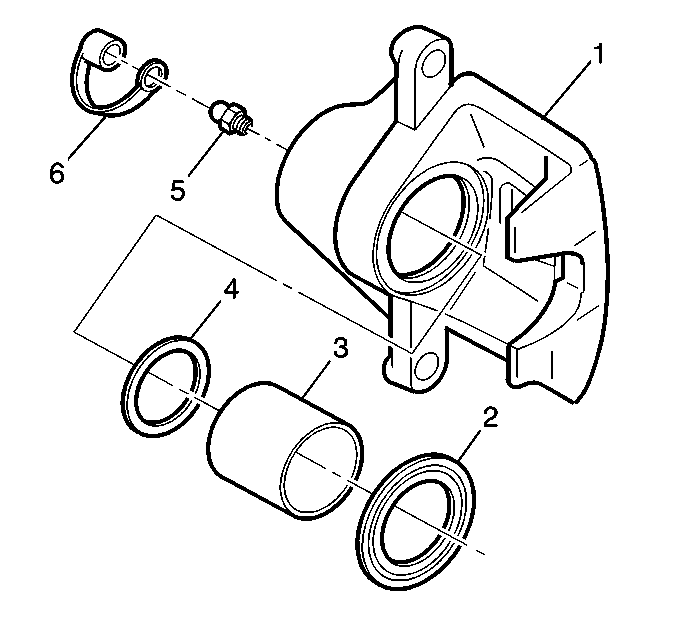
Important: Do not use abrasives to clean the brake caliper piston.
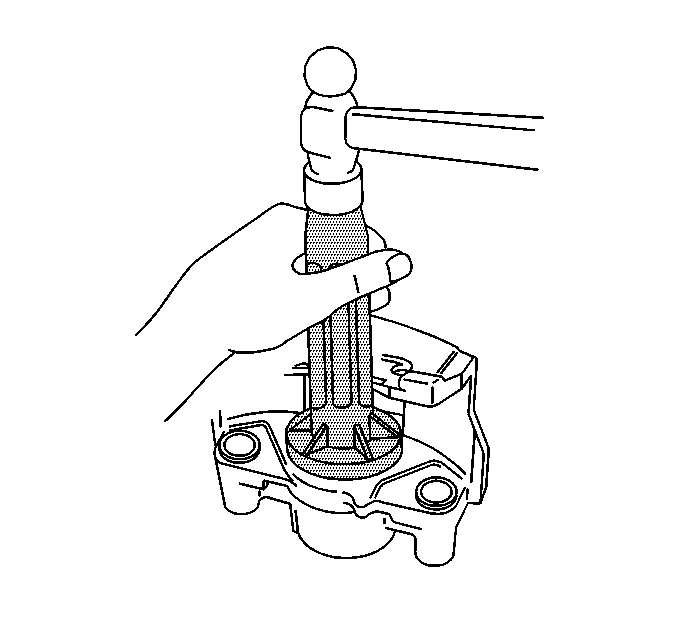
Front Brake Caliper Overhaul LD8
Caution: Refer to Brake Fluid Irritant Caution in the Preface section.
Caution: Refer to Brake Dust Caution in the Preface section.
Notice: Refer to Brake Fluid Effects on Paint and Electrical Components Notice in the Preface section.
Disassembly Procedure
Caution: Do not place your fingers in front of the piston in order to catch or protect the piston while applying compressed air. This could result in serious injury.
Important:
• Replace all the components included in the repair kits used to service
this brake caliper. • Lubricate the rubber parts with new Delco Supreme 11®, GM P/N 12377967
(Canadian P/N 992667) or equivalent DOT-3 brake fluid to make
assembly easier. • If any hydraulic component is removed or disconnected, it may be necessary
to bleed all or part of the brake system. • The torque values specified are for dry, non-lubricated fasteners. • Perform the service operations on a clean bench, free from all mineral
oil materials.
- Remove the brake caliper from the vehicle. Refer to Front Brake Caliper Replacement .
- Drain the brake fluid from the brake caliper.
- Place a 25 mm (1 in) block of wood between the caliper and the piston.
- Install a large C-clamp over the body of the brake caliper with the C-clamp ends against the rear of the caliper body and against the block of wood.
- Carefully remove the brake caliper piston by directing low pressure compressed air into the brake caliper inlet hole.
- Remove the C-clamp form the caliper.
- Remove the block of wood from the caliper.
- Install clean cloths to pad the interior of the caliper housing between the remaining caliper piston and the caliper body.
- To cover the open caliper bore place a 25 mm (1 in) block of wood between the caliper body and the brake caliper dust boot seal.
- Install a large C-clamp over the body of the brake caliper with the C-clamp ends against the rear of the caliper body and against the block of wood.
- Carefully remove the brake caliper piston by directing low pressure compressed air into the brake caliper inlet hole.
- Remove the C-clamp form the caliper.
- Remove the block of wood from the caliper.
- Remove the piston dust boot seals (2) from the seal counter-bores in the brake caliper and discard the boot seals.
- Using a small wooden or plastic tool, remove the piston seals (1) from the brake caliper bores and discard the piston seals.
- Remove the brake caliper bleeder valve cap.
- Remove the brake caliper bleeder valve (1).
- Remove the brake caliper bleeder valve seal (2) and discard.
- Inspect the brake caliper mounting bracket guide surfaces for corrosion and wear. Remove and replace the brake caliper mounting bracket if damaged or worn .
- Clean the brake caliper piston bores and seal counter-bores with denatured alcohol, or equivalent.
- Clean the brake caliper pistons with denatured alcohol, or equivalent.
- Dry the caliper piston bores and counter-bores with non-lubricated, filtered air.
- Dry the brake caliper pistons with non-lubricated, filtered air.
- Inspect the caliper bores for cracks, scoring, pitting, excessive corrosion.
- If light corrosion is present in the caliper bores, attempt to remove the imperfection with a fine emery paper. If the imperfection cannot be removed, replace the caliper assembly.
- If cracks, scoring, pitting, and excessive corrosion are present in the caliper bores, replace the caliper assembly.
- Inspect the caliper pistons for cracks, scoring, and/or damage. Replace the caliper pistons if any of these conditions exist.
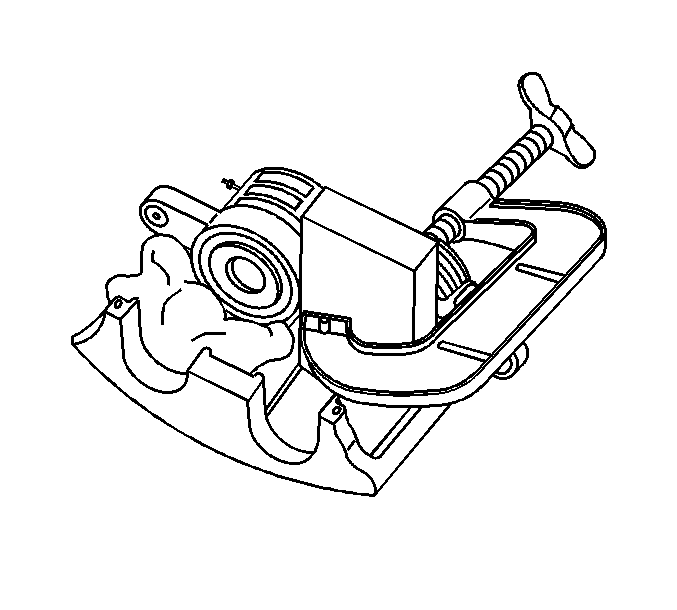
Notice: Use clean cloths to pad interior of caliper housing during piston removal. Use just enough air to ease the pistons out of the bores. If the pistons are blown out, even with the padding provided, it may be damaged.
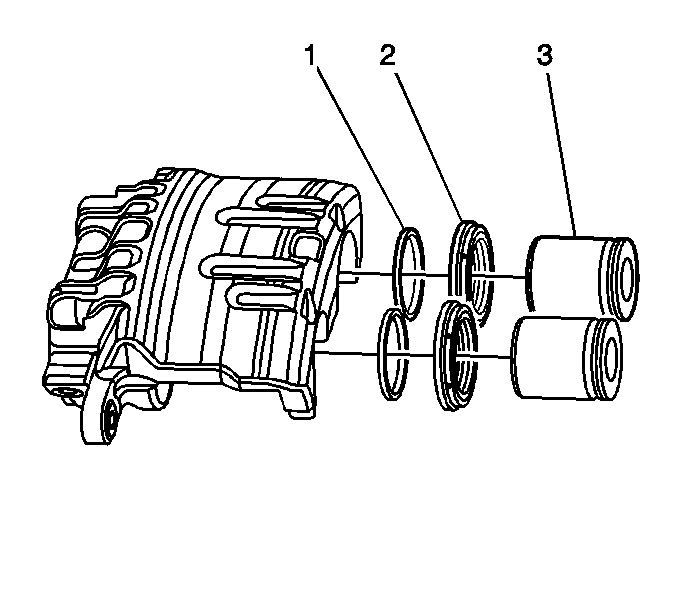
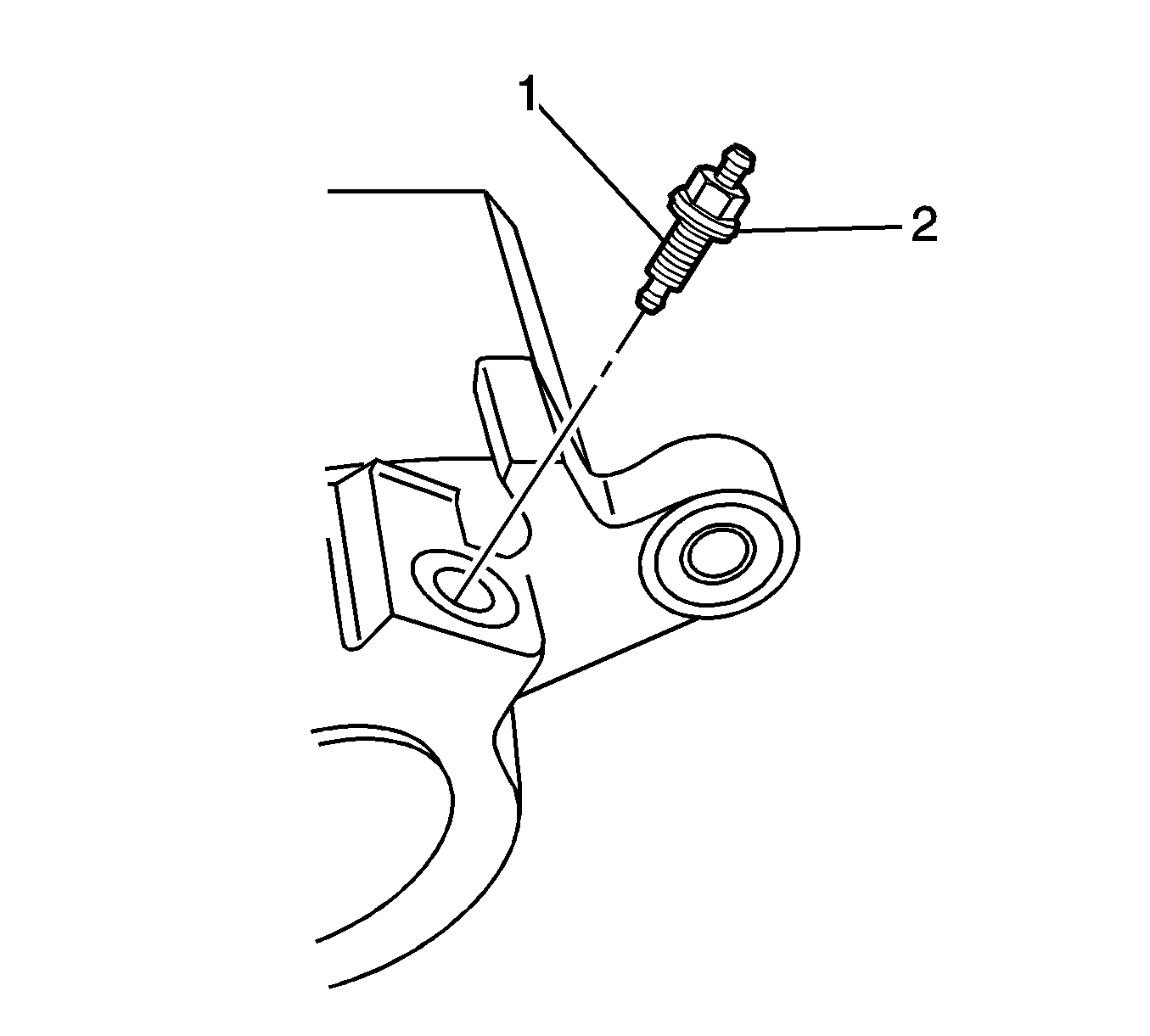
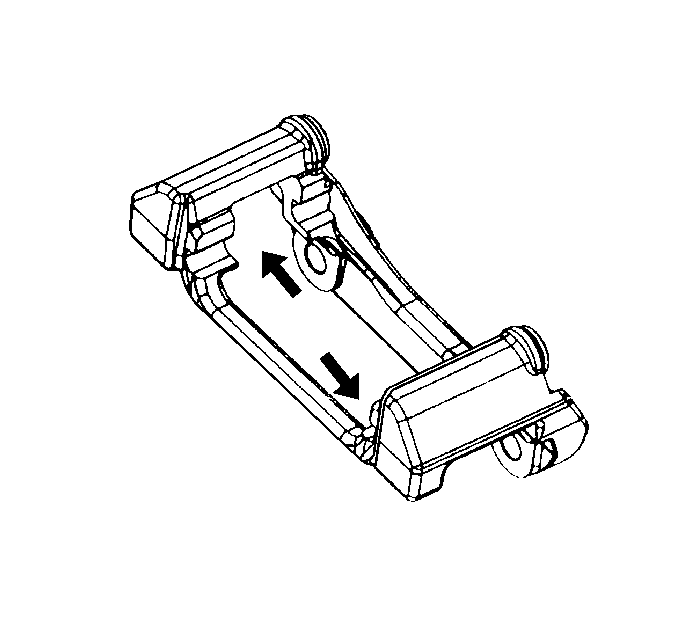
Important: Do not use abrasives to clean the brake caliper pistons.
Assembly Procedure
- Install the valve stem seal (2) over the threaded end of the bleeder valve (1).
- Install the brake caliper bleeder valve (1).
- Install the brake caliper bleeder valve cap.
- Lubricate the new piston seals (1) with Delco Supreme 11®, GM P/N 12377967 (Canadian P/N 992667) or equivalent DOT-3 brake fluid from a clean, sealed brake fluid container.
- Install lubricated piston seals (1) into the brake caliper bore seal grooves.
- Make sure the seals are not twisted.
- Install the piston dust boot (2) over the end of the piston (3) so that the fold will face toward the brake caliper housing piston bore opening.
- Seat the caliper dust boot into the brake caliper bore groove (1) and slide the piston into the brake caliper bore.
- Using your fingers, carefully push the piston to the bottom of the brake caliper bore.
- Ensure that the caliper dust boot is properly seated into the piston groove and into the groove in the brake caliper bore.
- Repeat steps 5 and 6 for the remaining piston.
- Install the brake caliper to the vehicle. Refer to Front Brake Caliper Replacement .
Notice: Refer to Fastener Notice in the Preface section.

Tighten
Tighten the brake caliper bleeder valve to 14 N·m
(124 lb in).

